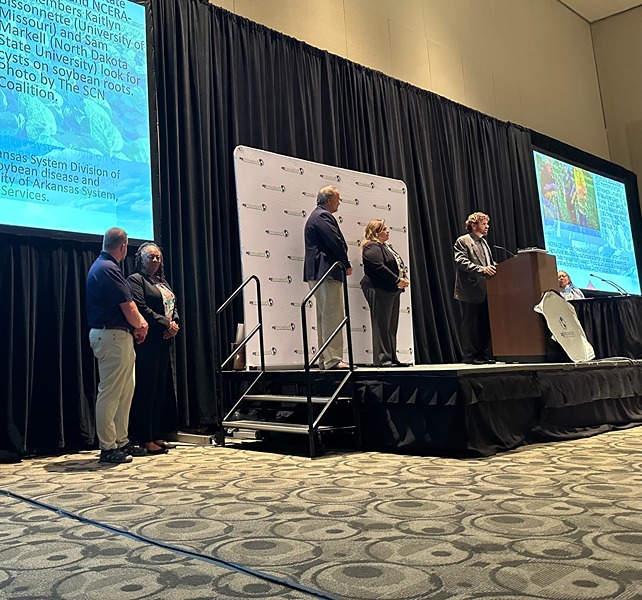The North-Central Region Research Alliance on Soybean Diseases accepts the 2023 National Excellence in Multistate Research Award
As a land-grant university, one of Purdue’s missions is to research relevant issues in agriculture and share that information with Indiana’s growers. Multistate research groups, like the North-Central Region Research Alliance on Soybean Diseases (NCERA-137), are created and supported by the Multistate Research Program to connect land-grant universities across the U.S. with agricultural research topics of importance. NCERA-137 has representatives from 14 different land-grant universities that collaborate on the study and management of soybean diseases.
Darcy Telenko, associate professor of plant pathology, has served as Purdue’s representative in NCERA-137 since her appointment at the university began in 2018. She served as the chair of NCERA-137 in 2020, and is also involved in the wheat, small grains, and corn disease multistate research groups.
The NCERA-137 has won annual awards at the regional level for four years in a row. This year they received the honor of the 2023 National Excellence in Multistate Research Award from AgInnovation, the institution that organizes land-grant research in the U.S.
 The NCERA-137 group fosters collaborative research, compares ecological and epidemiological data and findings on changing production methods, monitors new and re-emerging diseases in soybeans and improves communication between researchers, extension faculty, and producers. Their work also helps generate uniform and accurate fungicide efficacy tables and disease loss calculators (available online through the Crop Protection Network) that growers use to inform their farm management.
The NCERA-137 group fosters collaborative research, compares ecological and epidemiological data and findings on changing production methods, monitors new and re-emerging diseases in soybeans and improves communication between researchers, extension faculty, and producers. Their work also helps generate uniform and accurate fungicide efficacy tables and disease loss calculators (available online through the Crop Protection Network) that growers use to inform their farm management.
“We can come to conclusions faster if we have multiple people running the same research trial across the region,” Telenko shared regarding the impact of the NCERA-137 team. “Information needed to better manage diseases may take an individual scientist many years to compile, whereas we can reach solid conclusions in less time when working as a team across the region.”
This rapid response to diseases is especially important for new or emerging diseases. As climate change affects each season’s weather, where pathogens are successful at infecting crops also shifts. Telenko said that participating in NCERA-137 was particularly helpful to her extension research this year when red crown rot infected patches of soybeans in Indiana. Most Hoosier researchers and farmers have never dealt with this fungus. Telenko reached out to members of NCERA-137 in southern states where the pathogen is more common to learn from their data and ask for their advice in managing the disease.
Along with Daren Mueller and Loren Giesler, two other former chairs of NCERA-137, Telenko accepted the award on behalf of the group on Sept. 26 during a luncheon hosted by AgInnovation.
Telenko explained that this award provides more than just recognition to her group. “The award provided 10,000 dollars in funding that can be used by the working group. It can bring us together for additional training to help develop priorities and set up research projects collaboratively between the different members.”






